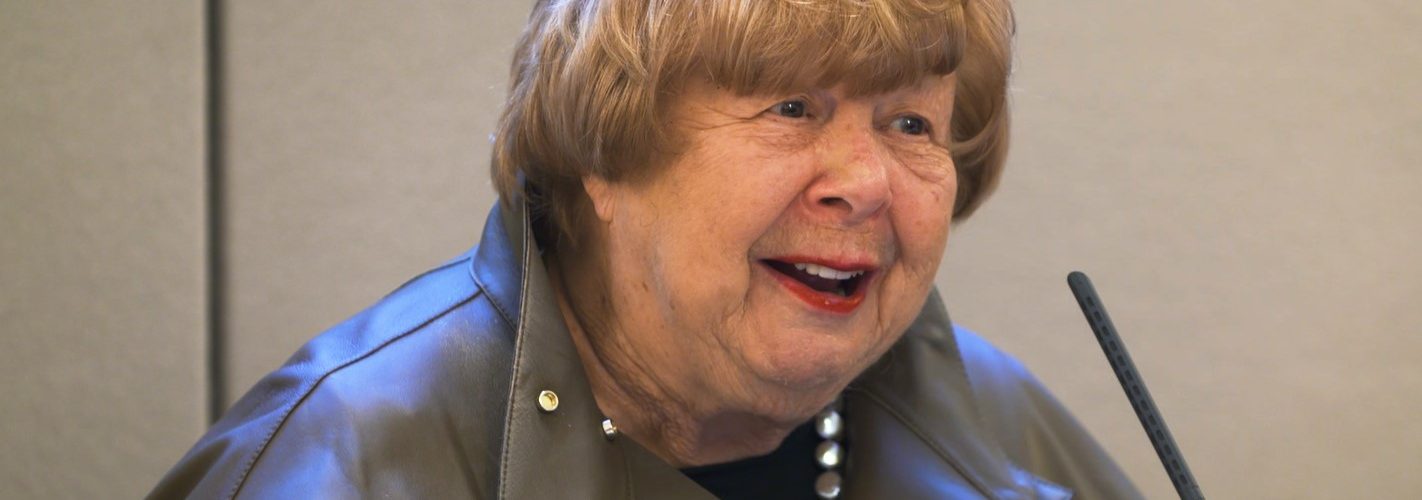Marjorie Perloff 1931-2024
In loving memory, we would like to bid farewell to Marjorie Perloff. A great scholar and human being, and one of the most important friends and members of the Wittgenstein Initiative.
6.4311
Der Tod ist kein Ereignis des Lebens. Den Tod erlebt man nicht.
Wenn man unter Ewigkeit nicht unendliche Zeitdauer, sondern Unzeitlichkeit versteht, dann lebt der ewig, der in der Gegenwart lebt.
Unser Leben ist ebenso endlos, wie unser Gesichtsfeld grenzenlos ist.
6.4311
Death is not an event of life. Death is not lived through.
If by eternity is understood not endless temporal duration but timelessness, then he lives eternally who lives in the present.
Our life is endless in the way that our visual field is without limit.”
―Ludwig Wittgenstein, Tractatus Logico-Philosophicus
Remembering Marjorie Perloff
Allan Janik (University of Innsbruck, co-author of Wittgenstein’s Vienna)
Marjorie Perloff roared into my life like a cyclone when she became The University of Innsbruck’s first Wittgenstein Guest Professor in 2016. I was asked to accompany her in the Brenner Archives and function as interlocutor when she spoke on Wittgenstein there. Encountering this amazingly dynamic lady, ten years my senior, was an absolutely unforgettable experience. The depth of her knowledge as well as the range of her interests insured that she was incapable of uttering a dull word. Her vitality was positively contagious. Since there is no lack of testimonials to her learning, I should like to focus upon the exemplary personal attributes that made encountering her an unforgettable experience. Both as a person and as a scholar she was totally generous. The person liberally supported those organizations that she took to deserve it. She was no less generous with praise for esteemed colleagues and students. Thus she said to me that when it came to understanding the culture of Vienna 1900, I was her “Gold Standard. I was about as flattered as I have ever been in those situations precisely because it was more than mere flattery. As America’s most distinguished critic of contemporary poetry and an academic of vast experience she possessed a polished facility for separating the academic wheat from the chaff. She could smell the quality, or lack of it, in the atmosphere around her on the basis of a nanogram of nonsense or attempted manipulation in the air. This experienced Grande Dame was a step ahead of the folks around her. This ability enabled her to anticipate and avoid unpleasant encounters. Her enormous determination was only comparable to an equally enormous good humor. Little wonder that everyone who came in contact with her misses her so much.
Thank you, Marjorie Perloff
Christian Witt-Dörring (Art Historian and Curator) and Michael Huey (Artist and Historian)
It was Marjorie Perloff’s book The Vienna Paradox. A Memoir, which awakened in me the desire to get to know the author and, above all, the person behind the story. Her approach to the fundamental question of belonging, shaped by her own family history, touched me and spoke to familiar things in me. Her openness and honesty—the vulnerability she allowed herself to express—created a very particular kind of beauty that I found enchanting. In September 2015 Michael and I were in L.A. for the opening of my exhibition “R. M. Schindler: The Prequel” at the Schindler House, and Radmila Schweitzer arranged for us to meet Marjorie in her Pacific Palisades home. We quickly found a common language, one in which scholarship did not stand as an end unto itself but merely as one of many disparate elements in the search for meaning in our individual cases of ‘where from’ and ‘where to.’ Facts underpinned our conversation; the way Marjorie put these together, however, subjectively, and in a highly personal and independent thought process, endowed them with both humor and lightness—a wonderful contrast to the heaviness of the subject material. Rather than undermining the significance of her insights, the humanity of this approach endowed them with added credibility. For me, her intellectual generosity is an important link in making sense of a world that shaped me and whose culture I am trying to understand. As a result, she is a part of my intellectual journey and I am grateful to her for that.

